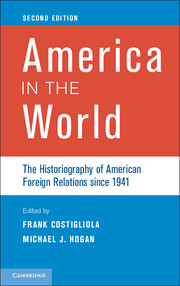Book contents
- Frontmatter
- Dedication
- Contents
- List of Contributors
- Preface
- 1 Introduction
- 2 The Charlie Maier Scare and the Historiography of American Foreign Relations, 1959–1980
- 3 Chaps Having Flaps: The Historiography of U.S. Foreign Relations, 1980–1995
- 4 Still Contested and Colonized Ground: Post–Cold War Interpretations of U.S. Foreign Relations during World War II
- 5 Recent Literature on Truman’s Atomic Bomb Decision
- 6 The Cold War
- 7 Cold War Presidents: Dwight D. Eisenhower, John F. Kennedy, Lyndon Baines Johnson, and Richard M. Nixon
- 8 The War that Never Ends: Historians and the Vietnam War
- 9 Culture and the Cold War: U.S.–Latin American Historiography since 1995
- 10 Impatient Crusaders: The Making of America’s Informal Empire in the Middle East
- 11 Explaining the Rise to Global Power
- 12 Bringing the Non-State Back In
- 13 Technology and the Environment in the Global Economy
- 14 U.S. Mass Consumerism in Transnational Perspective
- 15 A Worldly Tale
- Index
- References
2 - The Charlie Maier Scare and the Historiography of American Foreign Relations, 1959–1980
Published online by Cambridge University Press: 05 June 2014
- Frontmatter
- Dedication
- Contents
- List of Contributors
- Preface
- 1 Introduction
- 2 The Charlie Maier Scare and the Historiography of American Foreign Relations, 1959–1980
- 3 Chaps Having Flaps: The Historiography of U.S. Foreign Relations, 1980–1995
- 4 Still Contested and Colonized Ground: Post–Cold War Interpretations of U.S. Foreign Relations during World War II
- 5 Recent Literature on Truman’s Atomic Bomb Decision
- 6 The Cold War
- 7 Cold War Presidents: Dwight D. Eisenhower, John F. Kennedy, Lyndon Baines Johnson, and Richard M. Nixon
- 8 The War that Never Ends: Historians and the Vietnam War
- 9 Culture and the Cold War: U.S.–Latin American Historiography since 1995
- 10 Impatient Crusaders: The Making of America’s Informal Empire in the Middle East
- 11 Explaining the Rise to Global Power
- 12 Bringing the Non-State Back In
- 13 Technology and the Environment in the Global Economy
- 14 U.S. Mass Consumerism in Transnational Perspective
- 15 A Worldly Tale
- Index
- References
Summary
The Charlie Maier Scare began in 1980. In many ways its grip on the historiography of American foreign relations persists to the present day. In an essay for the Past Before Us, a panoramic assessment of contemporary American historical scholarship, Harvard historian Charles S. Maier wrote:
The history of international relations (including here American diplomatic history as well as that of other countries) cannot, alas, be counted among the pioneering fields of the discipline in the 1970s. At universities and among the educated public that reads and helps to produce serious historical scholarship, diplomatic history has become a stepchild. Promising graduate students are tempted by the methodological excitement attending social history. The output of mature scholars has been intermittent. Seminal and rich works indeed have appeared. Still, there has been no wave of transforming research during the 1970s comparable to the sustained output on American slavery or labor or the prenational American experience…. For historians of American foreign relations there was no catalytic book comparable, for example, to E. P. Thompson’s Making of the English Working Class.
The reverberations of Maier’s comments unleashed what can only be considered a thirty-year panic among historians of American diplomacy. Maier tapped into an escalating unease and dread about the future of the field. The social history train, the new trinity of race, class and gender, and, soon, the cultural turn seemed to leave diplomatic historians in the dust. Replacement lines were no longer a sure thing. Opportunities to publish were drying up, as were book prizes. The “best” graduate students, as Maier suggested, were looking elsewhere. Or so go the dominant memories of those dark decades.
- Type
- Chapter
- Information
- America in the WorldThe Historiography of American Foreign Relations since 1941, pp. 9 - 29Publisher: Cambridge University PressPrint publication year: 2013
References
- 1
- Cited by



